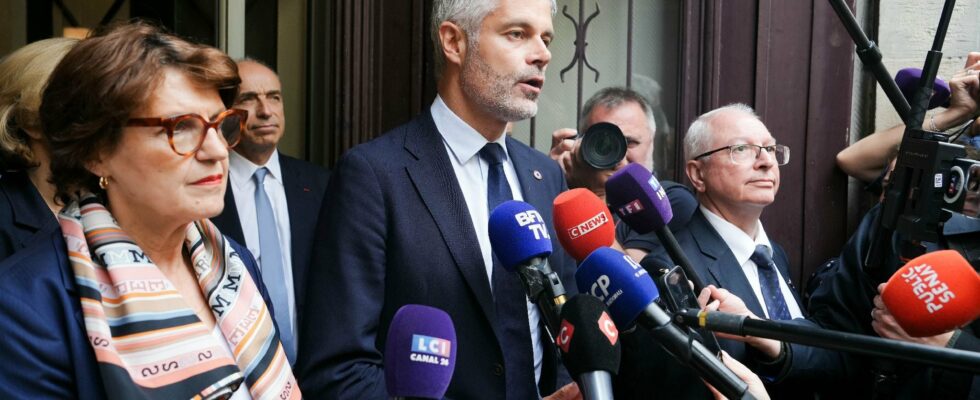For the backdrop: Notre-Dame de France and the cathedral of Puy-en-Velay. In the background, no activists. At around 9 p.m., Laurent Wauquiez gave a short speech from his stronghold in Puy-en-Velay, the prefecture of Haute-Loire. Three minutes, to designate an opponent: the RN candidate, Alexandre Heuzey, who came second. “The inhabitants of the Loire have spoken, choosing the clarity of convictions and the strength of roots in the face of a parachuted candidate,” he declared. Alexandre Heuzey, administrator at the European Parliament and originally from Haute-Garonne, had no connection with Haute-Loire before this election.
If the first step is taken for Laurent Wauquiez, nothing is yet won for him. Surprise candidate in the 1st constituency of Haute-Loire, the boss of the Auvergne-Rhône-Alpes region is qualified for the second round of the legislative elections. With 36.88% of the votes, he is ahead of Alexandre Heuzey (34.88%), whom he will face in a week. The New Popular Front candidate, the ecologist Celline Gacon, obtains 18.04% of the votes and, if she maintains herself, qualifies for a triangular.
A weakened party
In his speech, Laurent Wauquiez announced that he would remain a “regional elected official” if he won the legislative elections. Explaining that he wanted to “watch over local services” and “promote public order”, the president of the Auvergne-Rhône-Alpes region emphasised ultra-local campaign arguments, in response to an opponent who “came from Nice, worked in Brussels and was not even able to vote in the constituency today”.
Laurent Wauquiez then slipped away furtively. This first round is bitter for the former president of the LR who, if he keeps his head in his stronghold, is nevertheless closely followed by the RN candidate. During these surprise legislative elections, the man is playing part of his political future. A victory could allow him to return to the National Assembly. Five years after his resignation from the LR presidency, a defeat would, on the contrary, be a disavowal. For the moment, he is one of the rare right-wing candidates qualified for the second round. According to initial estimates, the party would only obtain 10% of the votes, compared to 10.42% in 2022. The weakened party is also greatly divided, while Eric Ciotti, its president, announced an alliance with the RN during these legislative elections. “Everything is open now”, declared Alexandre Heuzey, assuring that he had benefited from “the RN momentum of the European elections”. “People need to realise that this is a national election, and that they can have a deputy from the future majority in the Assembly,” he continued.
“It’s a triangular”
Although he largely targeted his opponent from the National Rally, Laurent Wauquiez did not mention the candidate of the New Popular Front, Céline Gacon, who was nevertheless qualified at this time for the second round. “It’s a triangular this evening, despite what Mr. Wauquiez announces,” she got annoyed. For the moment, the NFP candidate has not withdrawn, explaining that she is waiting for the end of “consultations at local and national level” to announce her decision. “I am also waiting for a phone call from Marine Tondelier,” she explained, then seeming to open the door to a withdrawal to counter the National Rally: “One thing is certain: we are all Republicans.”
Any voting instructions for the second round are in fact suspended from the decision of the New Popular Front. “In the event that there is a triangular, the people of Algeria will decide. They have the right to think what they want,” declared Cécile Gallien, Ensemble candidate. Eliminated in the first round, the candidate of the presidential majority collected 9.44% of the votes. “It is not with my less than 10% that I am going to influence the election,” she explained. “But this result does not surprise me: all the local and national populist speeches fuel this far-right vote” . The elected official, mayor of Vorey-sur-Arzon, sees the National Rally arriving first in her town. “I am not surprised, but I am sad,” she continued, worrying “about the violence that could happen on the evening of July 7.”
